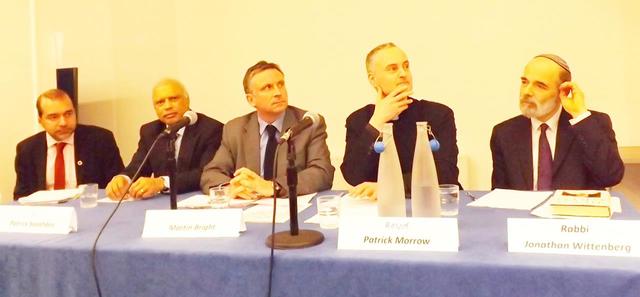From left to right: Sheikh Dr Muhammad al-Hussaini; Dr Patrick Sookhdeo; chairman Martin Bright: Rev. Patrick Morrow, and Rabbi Jonathan Wittenberg at last week's discussion in London on interfaith dialogue.(Photo: M Huberman)
"It's good to talk,"to quote the old BT ad. 'Jaw-jaw' is better than 'war-war', as Churchill once said.
Who can argue with interfaith dialogue? As with motherhood and apple pie - what's not to like? But is there a point where dialogue between Christians, Jews and Muslims can prove not just fruitless, but destructive?
At a panel discussion last week arranged at Friends' House in London by Harif and Spiro Ark: 'Interfaith dialogue: does it work? it dawned on some that disapproval or reservations about interfaith dialogue, publically expressed, could be dangerous to your health. Sheikh Dr Muhammad al-Hussaini, of the Imams and Rabbis Council (Children of Abraham), drove home the point that 'moderate' Muslims such as himself ran risks merely for being openly critical. He reduced the audience to tears as he threw away his prepared statement and talked with emotion about how his very appearance on the panel had exposed his family to threats and harassment.
Interfaith dialogue, he claimed, was an industry funded by petrodollars whose function was to manipulate genuine people of good-will for 'PR advantage' and confer legitimacy on extremists.
For fellow panellist Dr Patrick Sookhdeo, of the Barnabas Fund, serving persecuted Christians worldwide, interfaith dialogue reminded him of an encounter between a fox and a chicken where the chicken was on the menu.
Not only had interfaith dialogue failed to protect the rights of women, children and minorities, but hypocrisy was rife, he said. A Pakistani law-maker extolling the virtues of interfaith dialogue turned out to be the architect of the blasphemy law, under which Christians and converts from Islam could be condemned to death.
On the other side of the debate, Reverend Patrick Morrow of the Council of Christians and Jews said interfaith dialogue could lead to some real successes. He would dialogue with the devil if it helped. Rabbi Jonathan Wiittenberg argued that if there were a 0.0001 percent chance that dialogue could lead to better understanding, he would do it.
You dialogue with your enemies, not your friends: the example was proffered of Jo Berry: her father was blown up by the IRA, but she talked with her father's murderer.
The discussion, expertly chaired by Martin Bright, political editor of the Jewish Chronicle, was eloquent and far-reaching. The audience expressed a range of views for and against.
The conclusion was that dialogue can be a good thing, especially when it occurs naturally and without contrivance. But be careful to check that the sheep you are talking to is not really a wolf, and make quite sure that you are not his next meal.




